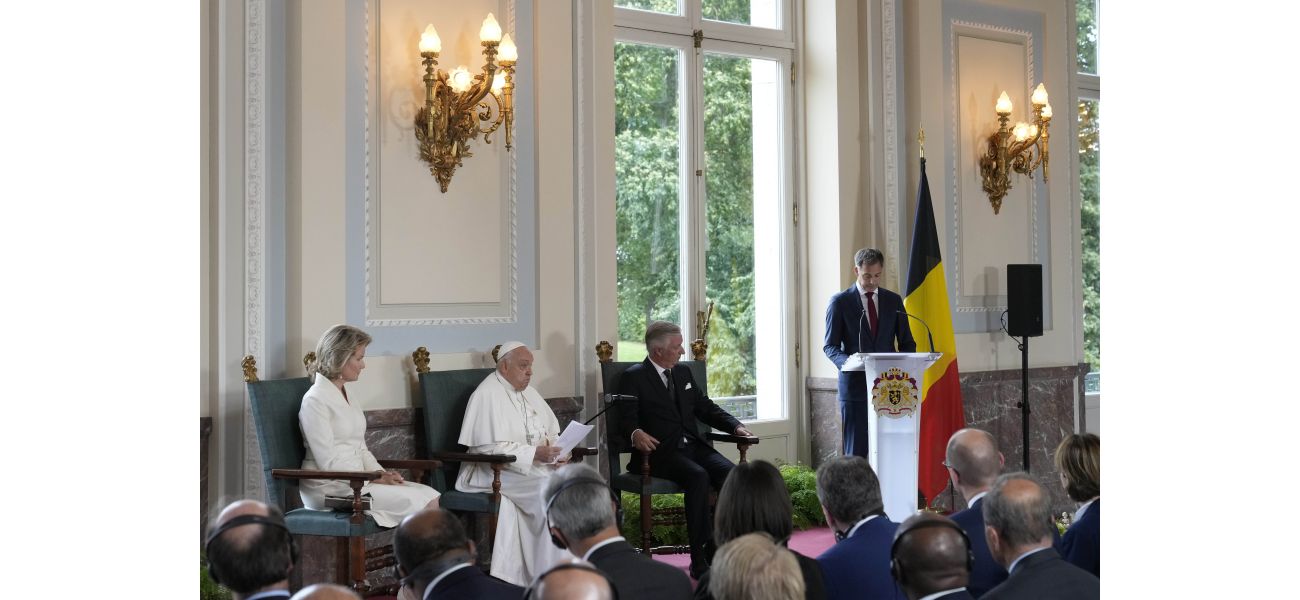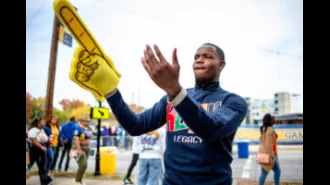Belgian leaders confront Pope Francis about church's sex abuse scandal
Belgium's leader confronted the Pope about the Catholic Church's history of sexual abuse and cover-ups, calling for transparency.
September 27th 2024.

Belgium's prime minister, Alexander De Croo, did not hold back when he addressed Pope Francis directly about the Catholic Church's troubling record of sexual abuse and cover-ups in Belgium. He demanded that concrete actions be taken to acknowledge the past and prioritize the needs of the victims over those of the church.
De Croo's speech, delivered at the start of Francis' visit, was unlike anything the pope has ever experienced on a foreign trip. Typically, diplomatic protocol dictates that public remarks are polite and reserved. However, both De Croo and King Philippe of Belgium expressed their strong opinions to Francis, emphasizing the deeply personal and ongoing impact of the abuse scandal in their country.
The pope, who was applauded at the end of De Croo's speech, was expected to meet with victims privately later that day. In his impromptu response to De Croo, he acknowledged the gravity of the situation, stating that words alone are not enough and concrete actions are necessary.
De Croo's words resonated with the victims, who have long been advocating for justice and recognition. Emmanuel Henckens, a survivor, felt that the prime minister and the pope had finally addressed the root of the problem and could no longer turn a blind eye to the abuse.
However, another survivor, Koen Van Sumere, emphasized that the church must go beyond words and truly make amends by providing substantial reparations to the victims. He urged the pope to establish a universal system of reparations, but the Vatican has traditionally left it to local churches to handle financial settlements with victims.
Van Sumere stressed that forgiveness and reconciliation cannot be achieved with just an apology, but must also include tangible actions and compensation for the damages caused. He shared that the minimal amount he received from the Belgian church did not even cover the cost of his therapy.
The abuse scandal in Belgium has been ongoing for over two decades, with revelations slowly coming to light. In 2010, the resignation of Bruges Bishop Roger Vangheluwe, who had admitted to sexually abusing his nephew for 13 years, sparked outrage. The pope only defrocked him earlier this year, likely in preparation for his visit to Belgium.
The scandal resurfaced last year when a Flemish documentary aired, featuring Belgian victims sharing their stories of abuse and cover-ups by the Catholic hierarchy. This was the first time that Belgian victims had publicly spoken out, shedding light on the extent of the scandal in their community.
Both King Philippe and De Croo delivered their speeches in Dutch, the language spoken in the Flanders region where the abuse cases have gained the most attention. This was a significant decision, as it emphasized the severity of the issue in the affected community.
De Croo's speech was also outside the usual Vatican protocol, as typically only the king would address the pope. However, his office requested that he be allowed to speak, similar to when Prime Minister Justin Trudeau addressed the pope alongside the governor-general of Canada.
In his remarks, the pope acknowledged the church's responsibility in addressing the abuse and its commitment to implementing prevention programs and supporting victims in their healing process. However, after the strong words from De Croo and King Philippe, the pope went off-script to express his shame and commitment to ending the scandal.
The issue of forced adoptions in Belgium, similar to the scandal in Ireland's mother and baby homes, was also brought to the forefront during the visit. Many single mothers were coerced by the church to give up their newborns for adoption, and records of these adoptions have since disappeared. The pope expressed his sadness about these practices, but also noted that this was a societal issue at the time and not just limited to the church.
This is a problem that the pope is familiar with, given Argentina's own history of forced adoptions during the military dictatorship in the 1970s. In 2018, when he met with survivors of Ireland's forced adoptions, he issued a formal apology on behalf of the church. The victims in Belgium are also seeking a similar apology and a robust reparations program to address the trauma they have endured.
De Croo's speech, delivered at the start of Francis' visit, was unlike anything the pope has ever experienced on a foreign trip. Typically, diplomatic protocol dictates that public remarks are polite and reserved. However, both De Croo and King Philippe of Belgium expressed their strong opinions to Francis, emphasizing the deeply personal and ongoing impact of the abuse scandal in their country.
The pope, who was applauded at the end of De Croo's speech, was expected to meet with victims privately later that day. In his impromptu response to De Croo, he acknowledged the gravity of the situation, stating that words alone are not enough and concrete actions are necessary.
De Croo's words resonated with the victims, who have long been advocating for justice and recognition. Emmanuel Henckens, a survivor, felt that the prime minister and the pope had finally addressed the root of the problem and could no longer turn a blind eye to the abuse.
However, another survivor, Koen Van Sumere, emphasized that the church must go beyond words and truly make amends by providing substantial reparations to the victims. He urged the pope to establish a universal system of reparations, but the Vatican has traditionally left it to local churches to handle financial settlements with victims.
Van Sumere stressed that forgiveness and reconciliation cannot be achieved with just an apology, but must also include tangible actions and compensation for the damages caused. He shared that the minimal amount he received from the Belgian church did not even cover the cost of his therapy.
The abuse scandal in Belgium has been ongoing for over two decades, with revelations slowly coming to light. In 2010, the resignation of Bruges Bishop Roger Vangheluwe, who had admitted to sexually abusing his nephew for 13 years, sparked outrage. The pope only defrocked him earlier this year, likely in preparation for his visit to Belgium.
The scandal resurfaced last year when a Flemish documentary aired, featuring Belgian victims sharing their stories of abuse and cover-ups by the Catholic hierarchy. This was the first time that Belgian victims had publicly spoken out, shedding light on the extent of the scandal in their community.
Both King Philippe and De Croo delivered their speeches in Dutch, the language spoken in the Flanders region where the abuse cases have gained the most attention. This was a significant decision, as it emphasized the severity of the issue in the affected community.
De Croo's speech was also outside the usual Vatican protocol, as typically only the king would address the pope. However, his office requested that he be allowed to speak, similar to when Prime Minister Justin Trudeau addressed the pope alongside the governor-general of Canada.
In his remarks, the pope acknowledged the church's responsibility in addressing the abuse and its commitment to implementing prevention programs and supporting victims in their healing process. However, after the strong words from De Croo and King Philippe, the pope went off-script to express his shame and commitment to ending the scandal.
The issue of forced adoptions in Belgium, similar to the scandal in Ireland's mother and baby homes, was also brought to the forefront during the visit. Many single mothers were coerced by the church to give up their newborns for adoption, and records of these adoptions have since disappeared. The pope expressed his sadness about these practices, but also noted that this was a societal issue at the time and not just limited to the church.
This is a problem that the pope is familiar with, given Argentina's own history of forced adoptions during the military dictatorship in the 1970s. In 2018, when he met with survivors of Ireland's forced adoptions, he issued a formal apology on behalf of the church. The victims in Belgium are also seeking a similar apology and a robust reparations program to address the trauma they have endured.
[This article has been trending online recently and has been generated with AI. Your feed is customized.]
[Generative AI is experimental.]
0
0
Submit Comment





